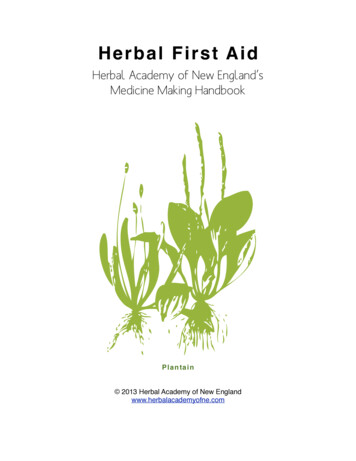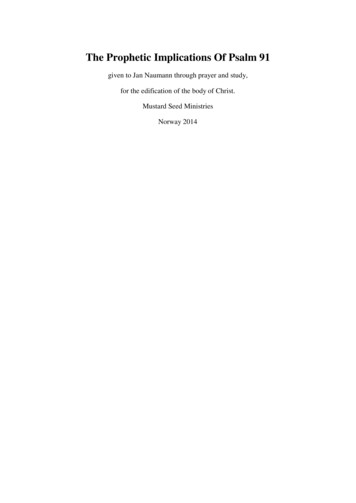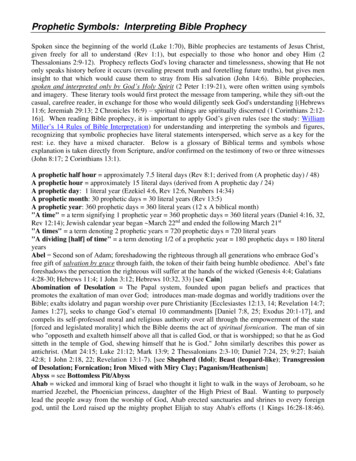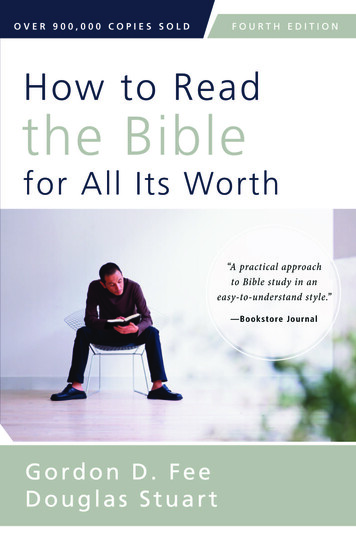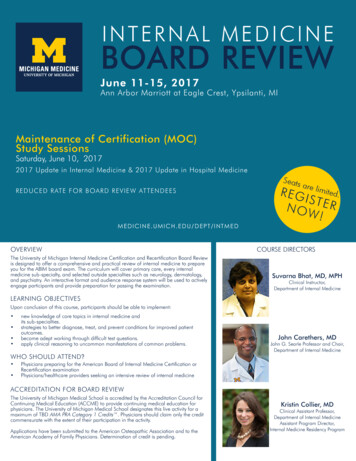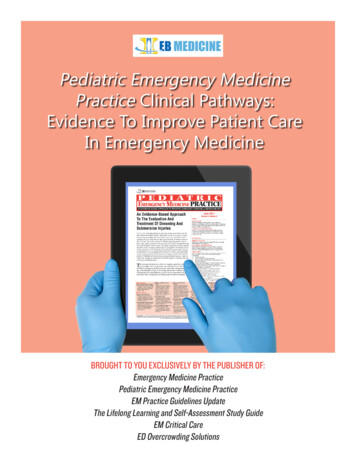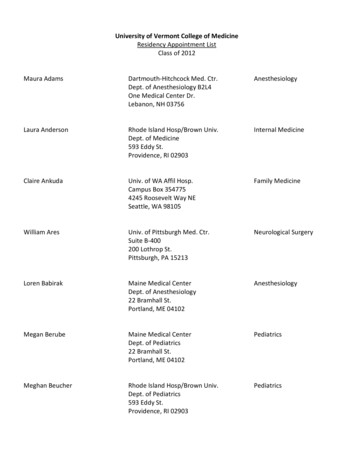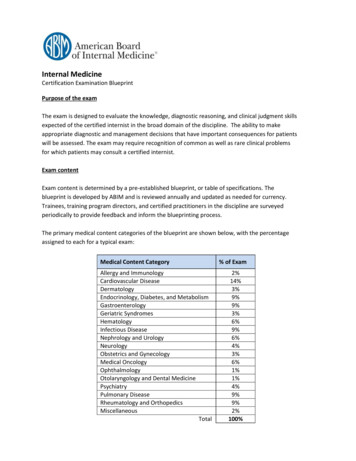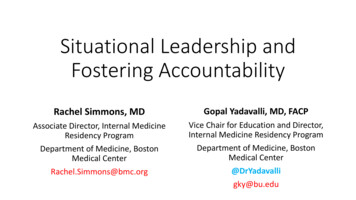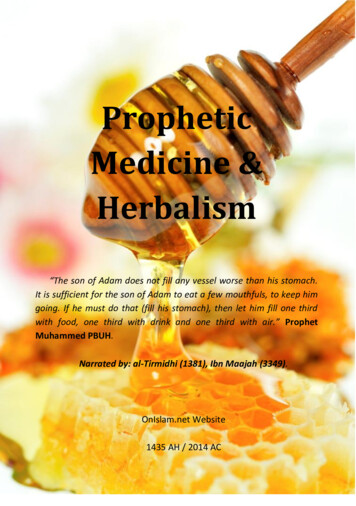
Transcription
PropheticMedicine &Herbalism“The son of Adam does not fill any vessel worse than his stomach.It is sufficient for the son of Adam to eat a few mouthfuls, to keep himgoing. If he must do that (fill his stomach), then let him fill one thirdwith food, one third with drink and one third with air.” ProphetMuhammed PBUH.Narrated by: al-Tirmidhi (1381), Ibn Maajah (3349).OnIslam.net Website1435 AH / 2014 AC
OnIslam.net website 1435 AH / 2014 ACAll rights reserved. No part of this publication may be reproduced,stored in a retrieval system, or transmitted in any form or by anymeans, electronic, mechanical, photocopying, recording or otherwise,without written permission from OnIslam.net website.www.onislam.net
www.onislam.net-3-Table of ContentChapter I: Healthy Prophetic Advices . 9 The Medicine of the Prophet: A Message Par Excellence 10 Health Benefits of Prophetic Condiments . 27 Miracle Foods from Allah. 38 Foods of the Prophet: Fruits & Vegetables of the Prophet48 Siwak: Preventive Medicine for Your Teeth . 59 Dental Health and the Miswak . 65 Grains of the Prophet . 72Chapter II: Islamic Heritage of Herbalism: .79 Herbs in Hadith: Exotic Herbs . 80 Timeless Black Seed . 91 Barley: Ancient Food for Future Nutrition. 97 Pros & Cons of Garlic's Medicinal Properties . 110 Allah's Medicine Chest: Lemons. 121 Parsley: Herbal Multivitamin . 130
HealthyPropheticAdvices - 4 - Stevia: Bittersweet Story . 139Chapter III: Herbs in Modern Healthcare: .151 Health and Nutrition of The Prophet: Prophetic Sayings &Modern "Discoveries" . 152 Prophetic Medicine: An Old Prescription for a New Era 164 Prophetic Medicine in Modern Life. 189www.onislam.net
www.onislam.net-5-IntroductionPraise be to Allah.We thank Him, theMost High, and seekHisHelpandForgiveness.Weseek refuge in Allahfrom the evils withinourselves and that of bad deeds.He whom Allah guides, is truly guided, andwhom Allah leaves to stray, none can guidehim. We bear witness that there is no god butAllah and that Muhammad is His final Prophet(Peace and Blessings be Upon Him). We askAllah to bless our Prophet Muhammad, hisfamily, his Companions, and all his followers,from the beginning of his call to the Day ofJudgment.
HealthyPropheticAdvices - 6 -Prophetic Medicine simply refers to theactions done and thought said by the ProphetMuhammedwithregardstosickness,treatment, nutrition, and hygiene. It is distinctfrom Islamic medicine, in that the latter is abroader category encompassing a variety ofmedical practices rooted in the Ancientcivilizations of the Muslim nations whichinfluenced Mediveval Islamic Medical sciences.Prophetic medical traditions exhort humansto not simply stop at following Muhammad'steachings, but encourage them to search forcures as well. The literature of Propheticmedicine thus occupies a symbolic role in theelucidation of Islamic identity as constituted bya particular set of relationships to science,medicine, technology and nature.www.onislam.netIbn Abbas has also narrated that ProphetMohammad (peace be upon him) said: “There
www.onislam.net-7-are two blessings which many people lose:(They are) health and free time for doinggood.” (Al-Bukhari).Prophet Muhammed PBUH had a firm beliefin the existence of a cause and a cure forevery disease and that was described in manyprophetic hadiths such as: “Make use ofmedical treatment, for Allah has not made adisease without appointing a remedy for it,with the exception of one disease, namely oldage.” Narrated by: Abu Dawud, Sunan AbuDawud.About 50 hadiths on specific ailments andtheir remedies have been grouped togetherunder the Chapter called Kitab-al-Tibb of wellknown collections of hadith by Bukhari,Muslim, Abu Dawud, Tirmidhi, and others.In addition of those, more than 300 hadithsreferred to hygiene, cleanliness, habit of eating
HealthyPropheticAdvices - 8 -and drinking. All these prophetic hadiths, whichnumber about 400, constitute the PropheticMedicine, and can be found together in theclassical books of Ibn al-Qayyim Aljouzi (8thCentury AD), Abu Nu’aim (5th Century AD),Abu Abd-Allah al-Dhahbi (8th Century AD), andAbu Bakar Ibn al-Sani (4th century AD).Inlight of this, OnIslam.net is glad topresent this book, whose contents are basedmainly on articles and features provided byreputed doctors and health specialists, to helpboth Muslims and non-Muslims, understand theconcepts of Prophetic healthy advices and itsrelation with herbs.We ask Allah Almighty to guide us all towhat is best in this world and in the Hereafter,Ameen.www.onislam.net
www.onislam.net-9-Chapter I: Healthy PropheticAdvicesSalman reported, The Messenger of Allah, peace andblessings of Allāh be on him, said "The blessing offood is the washing of hands before it, and thewashing of hands after it."
HealthyPropheticAdvices - 10 -The Medicine of the Prophet: A Message ParExcellence1The traditions(sunnah) of theProphetMuhammad (maythe peace andblessings of Allahbe upon him) arerich in advice andinstructions onsuch matters ashygiene,sanitation, andtreatment of1This article is an edited version of a chapter from a book bythewww.onislam.netauthor entitled “Medicinal Plants in the Traditions of ProphetMuhammad.” It was submitted by Dr. M. Iqtedar Husain Farooqi andpublished with his permission.
www.onislam.net- 11 -disease through the use of medication.Referred to as Al-Tibb Al-Nabawi (propheticmedicine) by Muslims the world over, about 50prophetic traditions on specific ailments andtheir remedies have been grouped togetherunder the chapter referred to as Kitab-al-Tibb(the book of medicine) in the well-knowncollections of Hadith (prophetic sayings) byBukhari, Muslim, Abu Dawud, At-Tirmidhi, andmore.Also, more than 300 traditions on aspects ofhygiene, cleanliness, habit of eating anddrinking, etc. find mention in these samecollections. All these traditions, which numberabout 400, constitute what is referred to asprophetic medicine, and can be found togetherin the classical books of Ibn al-Qayyim Aljouzi
HealthyPropheticAdvices - 12 -(8th century Hijrah), Abu Nu aim (5th centuryHijrah), Abu Abdullah al-Dhahbi (8th centuryHijrah), and Abu Bakr ibn al-Sani (4th centuryHijrah). Most of these original Arabic treatiseshave been translated into English and otherlanguages.Islamic Foundations of Well-BeingThe Prophet Muhammad laid down thefoundation for a social order in which everymember of society was advised to maintain ahealthy life, physically, psychologically, andspiritually. No aspect of life was to bedisregarded.In the opinion of Douglas Guthrie (A Historyofwww.onislam.netMedicine, 1945), great advances in medicinemade by Muslims during the Middle Ages were
www.onislam.net- 13 -mainly due to the impact of the traditions ofthe Prophet Muhammad. Guthrie writes, “Hadnot the Prophet Muhammad himself said, ‘OServant of God, use medicine, because Godhath not created a pain without a remedy forit’”? Guthrie failed to quote the source of thisimportant prophetic saying, but it is obviousthat he was referring to the famous hadithfrom Tirmidhi (one of the six most importantcollections of prophetic traditions).As a matter of fact, there are several suchsayings in which the Prophet laid great stresson medicine and discouraged seeking helpthrough amulets, relics, and charms. Forinstance, the Prophet once said, “There is aremedy for every malady and when theremedy is applied to the disease, it is cured.”
HealthyPropheticAdvices - 14 -This and several such hadiths have beendescribed in Bukhari, Muslim, and Abu Dawud.Once the Prophet was asked by one of hiscompanions, “Is there any good in medicine?”To this he emphatically replied, “Yes.” As aresult, Islamic teachings make it the duty ofevery society or group of people to conductresearch and discover the remedy for diseasesthat afflict human beings. The concept ofincurable diseases is thus alien to Islam.Changing Age-Old AttitudesThere were several occasions when theProphet visited the sick, and after enquiringabout the ailments advised to take the www.onislam.netmedicine prescribed from experiencedphysicians. On several occasions he advised
www.onislam.net- 15 -the sick to approach Harith bin Kalda, a wellknown Jewish physician of Thaqif (a place nearMadinah, Saudi Arabia where the Prophetresided at the time). On one particularoccasion the Prophet visited Sa d ibn AbiWaqqas who had suffered a heart attack.When the Prophet placed his hand on the chestof Sa d he felt great relief, but the Prophetcautioned him and said, “You’ve had a heartattack and therefore should consult Harith BinKalda, who is the expert physician.” It is theseand many other similar occasions that greatlychanged the attitude of the Arabs towardsdiseases. Arabs, during the pre-Islamic period,depended mainly on invoking supernatural aidor different deities for the treatment ofdisease.
HealthyPropheticAdvices - 16 -The Prophet Muhammad, realizing theconsequences of infectious epidemics, advisedhis companions that, “When you hear about abreak of plague in any area, do not enter thereand when it has broken in a land where youare, then do not run way from it (and thusspread it elsewhere).” On the basis of thishadith, Muslims considered precaution andvigilance against infectious epidemics as thecommand of God.The Prophet also opposed charms andincantations as a form of remedy for diseases.On some occasions, however, when physicalremedy (medicine) was not available, heallowed, mainly for psychological reasons, therecitation of an incantation that has definitewww.onislam.netmeaning. He also declared the victims ofepidemics such as cholera and the plague as
www.onislam.net- 17 -martyrs. This was a great consolation for thosewho suffered from it and realized the fatalconsequences.The Prophet always cautioned physicians totake extreme care in treating their patientsand warned those not well-versed in the skill ofmedicine not to attempt treating the ill lestthey might be held responsible for anycomplications. Quackery is, therefore,forbidden in Islamic medical ethics.The Prophet Muhammad advised his followersto always care for their health, and wheneverthey were ill, whether seriously or otherwise,consoled them and told them not to feel thatthey were victims of the wrath of Allah.“Disease,” he said, “is not the wrath of Allah,because Prophets also suffered great pains,
HealthyPropheticAdvices - 18 -much greater than ordinary people.” Imaginewhat a solace these sayings would haveprovided to the followers of Islam.Hope as MedicineThere are many Prophetic hadiths in Bukhari,Muslim and others that show that people wereaccustomed to go to the Prophet regularly andtell him about their ailments. He would advisethem to resort to medicine first and then prayto God to get rid of the disease. On severaloccasions he would himself suggest certainmedicines. For instance, in case of loss ofappetite he frequently advised his followers totake talbina, a preparation made from barley.For constipation he used to recommendwww.onislam.nettheuse of senna.
www.onislam.net- 19 -He was also in favor of regular use of honey forkeeping fit. Similarly, for different ailments hewould advise the use of olives, black cumin,chicory, endive fenugreek, ginger, marjoram,saffron, vinegar, and watercress. Hadiths onthese medicines and others show the concernof the Prophet for the welfare and good healthof his followers. For even apparently smallmatters like drinking water, eating food, andkeeping clean and tidy he also gave advice. Heis noted to have said, “Cleanliness is half offaith.”Some of the hadiths on black cumin, senna,and watercress are very thought provoking.For instance, the Prophet is reported to havesaid that, “Black cumin is a remedy for everydisease except death.” The Prophet expressed
HealthyPropheticAdvices - 20 -similar views on the efficacy of senna andcress.The style and language of these hadiths are aclear indication of the fact that the Prophetplaced great stress on medicines. Thesehadiths also put emphasis on confidencebuilding of the ill towards their diseases andagonies suffered. Very rational advice wasgiven that none should be disheartened by theintensity and duration of the disease becauseremedies have been provided by nature. Theywere also advised not to be afraid ofimpending death.Once during the time of the Prophet, a personcommitted suicide as he could not bear www.onislam.nettheagony of his disease. The Prophet condemnedthe act and refused to participate in the last
www.onislam.net- 21 -rites. Thus, hopelessness, despondency,dejection and frustration on account of seriousdisease and pain are against the spirit andtenets of Islamic medical ethics, as shown bythe tradition of the Prophet.Charms and Incantations: A Thing of thePastThere are several authentic hadiths, accordingto which people were said to come to theProphet for spiritual remedies for their illnessesand that of their kith and kin. The Prophet, ofcourse, prayed for them, but only aftersuggesting remedies in the form of medicines.Often he would advise the patients to consultthe best physician in the area. On one occasiona lady came to the Prophet with her child whowas bleeding because of a throat infection. He
HealthyPropheticAdvices - 22 -admonished her and advised her to treat thedisease by using the extract of costus andpseudo-saffron.Similarly, once his wife complained of anabscess on her finger. The Prophet suggestedan application of sweet flag on the fingers andthen asked her to pray to Allah for recovery.There was also an occasion when a scorpion bitthe Prophet himself. He immediately asked forhot water to which salt was added. The hotsolution was poured on his bitten fingers whilehe recited Qur’anic verses.These occasions and Prophetic hadiths ledMuslims to believe in the rationale of usingmedicine rather than resorting to charmsandwww.onislam.netincantations. On several occasions he exhortedthem not to depend on supernatural methods
www.onislam.net- 23 -of healing. He is also reported to have said,“charm is nothing but a work of Satan.”The Human ProphetAlthough the Prophet on one hand gavesuitable advice to his followers on earthlyaffairs when such situations were brought tohis attention, on the other hand he tried hisbest to create confidence in themselves so thatthey could act according to their ownexperience and opinions. Once, whilewithdrawing his advice given earlier on thecross pollination of date palm he said,“Whenever I command you to do somethingrelated to religion, do obey. And if I commandyou something about earthly matters, act onyour own (experience) and (do remember) Iam a human being.”
HealthyPropheticAdvices - 24 -Putting Prophetic Medicine IntoPerspectiveIn recent years, several books on propheticmedicine have been published, particularly inIndia and Pakistan, which do not project thetrue essence of the Prophet’s message. Forinstance, the author of a recently publishedbook entitled Tibbe Nabwi Aur Jadid Science(Prophetic Medicine and Modern Science),claims that Prophetic treatment of heart attackby eating seven dates, as was suggested toSa d ibn Abi Waqqas, should still be preferredover modern by-pass surgery for the disease,provided people have faith in the treatment ofthe Prophet. The learned author failed towww.onislam.netunderstand that the Prophet, while suggestingto Sa d to take dates as temporary relief, also
www.onislam.net- 25 -advised him to consult the expert physicianHarith bin Kalda for treatment.As a matter of fact, it is not desirable toconsider the Prophet’s traditions on medicineas similar to the prescription of a physician. Inthis connection, the opinion of Ibn Khaldun(14th century AD) is highly relevant andrealistic. He says, “The Prophet’s mission wasto make known to us the prescription of theDivine Law and not to instruct us in medicineof the common practice of ordinary life”(Muqqaddima). In his opinion, even veryauthentic hadiths cannot be taken as a meremedicinal prescription, which is the duty of anexperienced physician.He says, however, that “with sincere faith, onemay derive from them [hadiths] great
HealthyPropheticAdvices - 26 -advantage though this forms no part ofmedicine as it is properly called.” To emphasizehis point of view, Ibn Khaldun refers tooccasions when the Prophet tried to createconfidence in his followers by advising them totake their own judgments in worldly affairs.Prophetic medicine is a message parexcellence. It is an advice to keep a healthybody and soul and to have faith in bothphysical and spiritual treatment. It is acommand to us to strive hard to find newermedicines and newer remedies. It is a warningto those who consider diseases as the will ofGod for which no remedy is needed. It is anadmonition for us to keep away from so-calledspiritual treatment based on superstitionslikewww.onislam.netsorcery, amulets, and charms.
www.onislam.net- 27 -Health Benefits of Prophetic Condiments1The Prophet’sfavoritecondiments werehoney, olive oil,salt, and vinegar.The Qur’an(2:168) says, "Yeapeople: eat ofwhat is on earth,lawful andwholesome." According to Muslim, Allah’sMessenger said, "The stomach is the centralbasin of the body, and the veins are connectedto it. When the stomach is healthy, it passeson its condition to the veins, and in turn theveins will circulate the same; and when thestomach is putrescence, the veins will absorbsuch putrescence and issue the same."1By Karima Burns.
HealthyPropheticAdvices - 28 -We can assume from this Hadith that theProphet ate what suited his stomach. And whatbetter time to eat the best and the mostsuitable foods than during Ramadan? For theProphet has said, "Fast (the month ofRamadan) so to heal your bodies fromdiseases."Using the Hadith as a guide, I have explored,in a five-part series, how some of the Prophet’sfavorite foods are beneficial to our health. Partone deals with condiments; Part two, withfruits; Part three, with vegetables; Part four,with meat and milk products; and Part five,with grains.HoneyIn Bukhari (Volume 7: Book 65), Aishawww.onislam.netnarrates that, "Allah's Apostle used to love
www.onislam.net- 29 -sweet edible things and honey." He alsoattributed many healing powers to honey. TheHoly Qur’an (16:69) says, "From its [the bee’s]belly, comes forth a drink of varying colorswherein is a cure for people. Surely there is asign for those who would give thought."Honey is not just a sugar, but also a complexcombination of enzymes, organic acids, esters,antibiotic agents, trace minerals, and yetunidentified components! One pound of honeycontains 1.4 grams of protein, 23 milligrams ofcalcium, 73 milligrams of phosphorus, 4.1milligrams of iron, 1 milligram of niacin and 16milligrams of vitamin C. Honey has beenattributed externally with healing wounds andburns, and making the skin supple andsmooth. Internally, honey is a cure-all, with
HealthyPropheticAdvices - 30 -specific benefits for the digestive system andas a tonic for general health and well-being.Olive OilThe Prophet also advised us to, "Use olive oilas a food and ointment for it comes from ablessed tree" (Tirmidi). In Crete, a recentstudy showed that even though 90% ofCretans consume an average of 60-70 poundsof oil a year per person, the incidence ofcoronary disease is very low compared to othercountries.Everyone knows that animal fats containsaturated fatty acids that vertically increaseblood cholesterol levels. But mono-unsaturatedwww.onislam.netfatty acids, like olive oil, control LDL levelswhile raising HDL levels. In fact, no other
www.onislam.net- 31 -naturally produced oil has as large an amountof monounsaturated fatty acids (mainly oleicacid) as olive oil.Olive oil also contains vitamins E and K, andpolyphenols, which provide a defensemechanism that delays aging and preventscarcinogenesis, atherosclerosis, liver disorders,and inflammations. Oleates in the oil alsopromote bone formation in children and protectthe bones of the elderly. Even The Journal ofthe National Cancer Institute reported thatolive oil offers strong protection in the fightagainst breast cancer.SaltContrary to popular modern belief, salt is alsoa beneficial condiment. The Prophet said, "Saltis the master of your food. God sent down four
HealthyPropheticAdvices - 32 -blessings from the sky - fire, water, iron andsalt" (Ibn Maja). UNICEF reports that the bodyneeds only minute amounts of iodine (fromiodized salt) to function properly. Yet, a lack ofthe nutrient causes various disorders, fromstunted growth to cretinism, a most seriouscondition.Even mild deficiency produces mentalimpairment. Studies estimate that childrenliving in iodine- deficient areas forfeit up to 10to 15 IQ points.Doctors often recommend replacing water andsalt lost during exercise and when workingoutside in jobs such as agriculture. Increasedsalt intakes have been used successfullywww.onislam.nettocombat Chronic Fatigue Syndrome as well.Dramatic deficiencies or "excessive" sodium
www.onislam.net- 33 -intakes have been associated with otherconditions and diseases such as stomachcancer. Testing the salinity of perspiration hasproven to be a good test for cystic fibrosis. Themost talked-about effect of salt is theassociation of dietary sodium and elevatedblood pressures (hypertension). However, theAmerican Society published a good overview ofrecent scientific evidence as a supplement toThe American Journal of Clinical Nutrition forClinical Nutrition in February 1997, and theMedical Journal of Australia reviewed thatdebate earlier this year. They found that thekidneys efficiently process this "excess" sodiumin healthy people.In fact, in cases of hypotension, genetic factorsexplain a quarter to a half of blood pressurevariability – five times more than
HealthyPropheticAdvices - 34 -environmental factors such as stress, physicalactivity/exercise, smoking and, of course, diet.Among dietary risk factors, obesity is generallyrecognized as the most important followed byexcess alcohol consumption and then saltintake.In May 1998, JAMA published a large metaanalysis confirming a 1996 study anddocumenting, as well, a series of adversechanges to blood chemistry among thoseplaced on low-sodium diets in clinical trials. Alltold, there have been six clinical trials, five ofwhich were limited to randomized controlledtrials. These provide consistent evidence ofonly a minor blood pressure response to arestriction of dietary sodium.Vinegarwww.onislam.net
www.onislam.net- 35 -The Prophet has also called vinegar a "blessedseasoning" (Muslim). Modern science hasconfirmed that it indeed does have many"blessings." A recent book called, simply,Vinegar talks about many ways in whichvinegar benefits our health, and citesnumerous scientific proofs of this claim.However, vinegar "miracles" were known evenbefore the time of the Prophet (SAW).The first-century Greek doctor Dioscorides,who traveled widely with the Roman army, wasa careful observer of the medicine of his time.In his writings, he describes the use of asubstance he calls 'oxymel,' or sour honey, forarthritis-like pains.Over the centuries, oxymel – a combination ofapple cider vinegar and honey – has been
HealthyPropheticAdvices - 36 -widely used to dissolve painful calciumdeposits in the body, and for other healthproblems such as hay fever. This is becauseapple cider vinegar is nutrient-rich, includingamino acids, enzymes, manganese,magnesium, potassium, and silicon. Itimproves metabolism and can counteract theeffects of excess lactic acid in the bloodstreamreleased during exercise and stress.It has also been used as a tonic to help thosewith arthritis, blood pressure, cholesterol,colds, constipation, cramps, diabetes, diarrhea,indigestion, muscle stiffness, and sore throat.In his over 300-page book Vinegar, D.Lawrence cites over 100 studies in praise ofthe condiment.www.onislam.net
www.onislam.net- 37 -Many more claims of vinegar’s benefits aredocumented in respected journals like ScienceDigest, The Pharmacological Basis ofTherapeutics and The Journal of the AmericanMedical Association.Perhaps, though, the most important thing wecan learn from Prophetic nutrition ismoderation. As we sort through the wisdoms ofProphetic nutrition in our attempt to reconcilethem with modern "science," we must alwaysremember what the Qur’an (20:8 1) says, “Eatof the good things We have provided for yoursustenance, but commit no excess therein."
HealthyPropheticAdvices - 38 -Miracle Foods from Allah1The Qur'an (Surat Al-A'raf: 7:160) says,"Eat of the good foods We have provided foryou."The question may arise: if Allah has providedus with so many good foods, why are so manypeople starving and many more suffering frommalnutrition?The answer may lie in our ignorance of theabundance that has been sent to us by Allah.We have beenblessed withmany "miraclefoods" thatprovide us withincredible1By Karima Burns.www.onislam.net
www.onislam.net- 39 -amounts of concentrated nutrition and healingand are also affordable. Many of these foodscan be grown or found in any environment.The modern market, however, is marketingmany of them as "super foods," and in theprocess, charging many times their actualcosts, which creates the illusion that healthyeating is expensive.On the other hand, there are agencies that areexploring the possibility of providing some ofthese "super foods" to supply nutrition topoverty stricken areas of the world. The Qur'anhints at some of these secrets when it says, "Itis He who has made the sea subject. that yemay seek (thus) of the bounty of Allah" (SuratYunus: 10:14), and "From within their bodies,a drink of varying colors comes. Wherein is
HealthyPropheticAdvices - 40 -healing for me: Verily this is a sign for thosewho give thought" (Surat An-Nahl: 16:69).In fact, most super foods are readily found innature and require minimal planting orharvesting. Some of the most readily availableare bee pollen, spirulina (algae), kelp, royaljelly, honey, wheat grass, flax seeds, andalfalfa and other sprouts. Among herbs thathave been taken as sustenance foods ismarshmallow root, used by the Chinese,Assyrians, Egyptians, and Greeks in times offamine.These "miracle foods" are readily availablesources of food for countries that are plaguedby famine and malnutrition, and they canbewww.onislam.netused to give a nutritional boost to people whohave adequate nutrition, are fasting, or are
www.onislam.net- 41 -suffering from a chronic illness. Many, such asbee pollen and algae, are used across specieslines so we are not inventing the idea of superfoods - we are simply rediscovering them.It is best to consume super foods regularly, toself-harvest them, or to buy them from areputable source that does not alter them byextracting substances from them or adding tothem (e.g., by making them into a health drinkwith fructose and other additives). Thefollowing is a list of some "miracle foods":1. Spirulina (Blue Green Algae): Blue GreenAlgae is the superior form of spirulina;however, they are both essentially thesame thing - algae that survives in hotsunny climates and is thought by many to
HealthyPropheticAdvices - 42 -be the solution to world hunger. Algaeproduce twenty times as much protein assoybeans. Furthermore, it contains manynutrients not found in any other singlefood source such as gamma-linoleic acid,vitamin B-12, iron, essential amino acids,chlorophyll, RNA, DNA, and phycocyanin(a substance that has increased the lifespan in lab rats). Algae curb the appetite,reduce cholesterol levels, and aid inmineral absorption. You can harvest it atany natural water source (within specificguidelines only - not all algae is edible) oryou can buy it in capsule or powder form.www.onislam.net
www.onislam.net- 43 -2. Kelp: Kelp is another type of seaweedand can be eaten raw, cooked, whole orchopped. It comes as a liquid, powder ordried. Used as a salt substitute to provideiodine as well as sodium, it containsmany minerals and vitamins inconcentrate, especially B vitamins. It isbeneficial to brain tissue, sensory nerves,the skin, nails, and blood vessels.3. Honey: Comprised of 35% protein andcontaining half of all the amino acids thebody needs, honey also has many otheressential nutrients such as B-complexand vitamins C, D and E.4. Bee-Pollen: The powder produced by theanthers of flowers and collected by bees,
HealthyPropheticAdvices - 44 -bee pollen contains 15% protein, Bcomplex vitamins, vitamin C, aminoacids, essential fatty acids, enzymes,carotene, calcium, copper, iron,magnesium, potassium, and plant sterols.It has an anti-microbial effect on thebody and strengthens the immunesystem.5. Royal Jelly: A combination of honey andpollen that is refined inside the nurse beeand secreted, this substance provides thebenefits of both pollen and honey plus ahigh concentration of pantothenic acid(vitamin B).www.onislam.net
www.onislam.net- 45 -6. Wheat Grass: Research shows that onepound of wheat grass is equal in nutrientsand vitamin content to twenty-fivepounds of choice vegetables. It is a livingfood that provides a powerhouse ofnutrition available to all, and it helps inthe elimination of cancerous growths.Produced by sprouting wheat berries, oneof the cheapest grains on the market,wheat grass can be grown easily on trayswith a little w
classical books of Ibn al-Qayyim Aljouzi (8th Century AD), Abu Nu’aim (5th Century AD), Abu Abd-Allah al-Dhahbi (8th Century AD), and Abu Bakar Ibn al-Sani (4th century AD). In light of this, OnIslam.net is glad to present this book, whose conte
